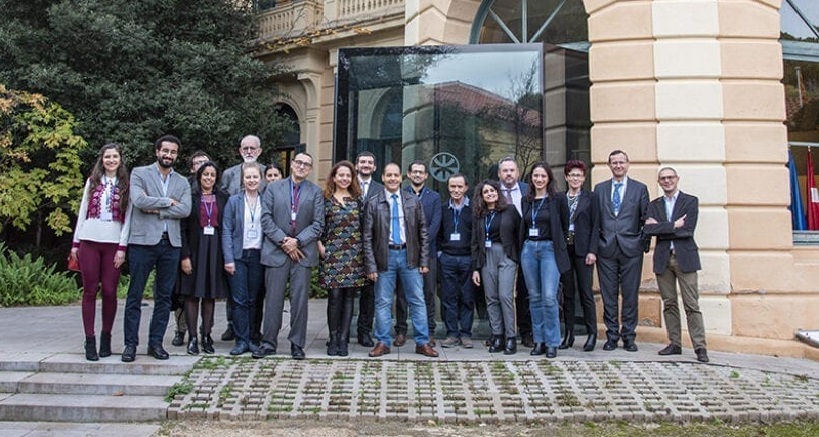Climate change, one of the emerging factors influencing migration in the Mediterranean
Ricard Zapata-Barrero, director of GRITIM-UPF and one of the coordinators of the Euro-Mediterranean Research Network on Migration, is the first author of a report that summarizes the current research agenda around the relationship between migration and climate change in the region and offers suggestions for improvement.

The Euro-Mediterranean Research Network on Migration (EuroMedMig), driven by the Interdisciplinary Research Group on Immigration (GRITIM-UPF), recognized academically by the IMISCOE European Network and institutionally by the Union for the Mediterranean (UfM), has published the first issue of the EuroMedMig Policy Paper Series. It has done so in the framework of the recently launched Jean Monnet project that seeks to identify and explore new areas of research into Mediterranean migration.
The report summarizes the current research agenda around the relationship between migration in the Mediterranean and climate change and “environmental degradation”, and makes a series of recommendations to improve the quality of research in this field.
These reflections are fostered under the global agreement on international migration (Global Compact), one of the first documents to map out the global challenges posed by human mobility, signed by over 160 countries, and the 2030 Agenda for sustainable development, which proposes mechanisms to eradicate poverty and inequality in the world, both promoted by the United Nations.
The first issue of the EuroMedMig Policy Paper Series, involving Ricard Zapata-Barrero, director of GRITIM-UPF and co-coordinator of the network, as first author, offers a summary of a meeting of experts which dealt with the “Deep roots of migration, environmental and climate change: exploring emerging drivers of human mobility in the Mediterranean”.
The meeting, arising from a Memorandum of Understanding between the Union for the Mediterranean and GRITIM-UPF, took place on 17 December 2019 at the headquarters of the UfM in Barcelona at Pedralbes Palace, with the goal of crossing agendas between experts on Mediterranean migration and experts on climate change in the Mediterranean.
Together, they shared knowledge to better define, assess and identify problems in the field of research and policies that seek to incorporate climate change and environmental degradation into their future action programmes and as future drivers of research and innovation.
Climate change, an emerging factor that interacts with other traditional ones and induce migration
The report notes that climate change is one of the many interrelated forces that drive migration, which ends up being the effect of a combination of factors of various kinds, including political and security-related, economic, social and demographic aspects.
In this context, the work stresses the need to deepen in the understanding of the potential impacts of environmental degradation and climate changes on human migratory behaviour, particularly with regard to mobility within the Mediterranean.
“Migration is a multi-causal phenomenon with cascade effects”
“Migration is a multi-causal phenomenon with cascade effects”, say the researchers who drafted the report. In their opinion, from the legal and political points of view, no designation has been mutually accepted by international and academic organizations that people’s decisions when migrating are induced by climate or environmental change.
There is a need for a change of perspective and the creation of future scenarios
The document provides that climate change and environmental degradation constitute an emerging issue that is slowly entering most research agendas on migration in the Mediterranean, and that we must think from this perspective in the long term: “Today, most of the research is contingent upon policy agenda and trapped by urgent challenges. Climate change and environmental degradation motivate us to work with anticipatory logic, following a scenario-building methodology”, the authors of the report state.
This factor, which induces mobility, must be incorporated by the policies of the EU, the Mediterranean states, regions and cities, the publication asserts. Thus, the document highlights the need for the Mediterranean definitively to be incorporated as a category of analysis in its geographical, regional and even geopolitical dimension.
Recommendations to progress in the quality of research
Other aspects the report determines as necessary in studies of Mediterranean migration are finding out what are the minimum resources for human subsistence and a dignified life? What forces a person to leave their region/city of origin?; studying the different types of migration (forced or voluntary, temporary or permanent); cross-sectoral policy responses at national, regional and international levels, and the various stages in the migration process (pre-displacement, displacement and return or resettlement).
For example, the experts stress the importance of determining whether environmental degradation, before causing cross-border displacement, leads to displacement from a rural to an urban area, which requires the implication of cities to find solutions. They also point out that to mitigate climate change, it is essential to consider governance from various levels (security and defence policies and humanitarian and development policies, etc.).
The document stresses the need for more rigorous research and for collecting better data on migration and climatic processes.
The document stresses the need for more rigorous research and for collecting better data on migration and climatic processes; establishing better modelling techniques to predict future migration flows in the Mediterranean region, or discriminating between “climatic variables” and “not climate variables” on the decision to migrate: drought, flooding or changing climatic cycles are fundamental for people who depend on the climate to survive.
Finally, other recommendations are to analyse the effects of sudden-onset and low-onset climatic events on migration; and to explore migration as a result of vulnerability, which causes migration from rural areas to the city. “The root cause approach should not solely focus on climate change, but also on other factors that play an important role in migration”, it concludes.
Reference work: Zapata-Barrero, Ricard, Karina Melkonian and Gülce Şafak Özdemir (prepared by) (2019) “Climate Change, Environmental Degradation and Mediterranean Migration: Premises for Shaping Future Policies”. EuroMedMig Policy Paper Series, no. 1 (December)
